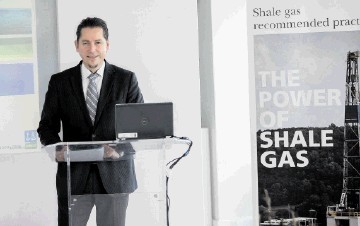
Shale gas is set to radically shake up the balance of global gas supplies and is described by DNV as a “game changer” . . . from the US, to Europe, to Asia-Pacific and elsewhere too.
But this new subset of energy is facing a variety of challenges in managing the safety, health and environmental risks involved, and a global standard for safe and sustainable shale gas extraction is yet to be established.
However, DNV is out to change that by launching a set of “Recommended Practice” guidelines that the industry is being invited to embrace.
Its belief is that a globally acknowledged framework would level the playing field across shale gas companies and nations.
Through its Recommended Practice, the Norwegian but global classification society/foundation aims to raise the overall awareness of risks from shale gas activities and how to best manage these risks.
The organisation believes that establishing a consistent and uniform understanding of work processes, tools and methods is essential for the shale gas industry to efficiently manage its safety, health and environmental risks.
It is the intention that the Recommended Practice may serve as a reference document for independent assessment or verification, and form the basis for a globally recognised standard for shale gas extraction.
Remi Eriksen, CEO of DNV Maritime and Oil & Gas told Energy that he thought the protocol would find widespread acceptance within about three years, with Europe as the start point, spreading to North America, Asia Pac and so-forth.
He said too that the recommended proactive would readily adapt to coal-bed methane extraction, which is assuming considerable importance in some countries, including Australia.
“It’s hard to say where it will gain first acceptance but our judgement right now is that it will be in Europe, in particular the UK and Poland,” said Eriksen.
He acknowledged that the EU is in flux regarding shale gas exploitation and that Brussels has yet to formalise a framework. Moreover, exploration to date had been limited with few successes and some member states had imposed bans on fracking.
“We have been consulting with the Commission, to find out more of what they’re doing and how they see the industry developing overall. What we have seen in the past is that, when DNV has done work on frameworks, it has been looked up and partly adopted by the Commission.
“It’s hard to know what will happen this time . . . whether the Commission will adopt the Recommended Practice, or part of it.”
Eriksen said that DNV’s work on carbon capture and storage about five years ago had been picked up by the Commission and incorporated into a Directive.
As for the US, he admitted that this would be a tougher nut to crack, given how far ahead the industry is already.
“I expect acceptance to take a little bit longer as risk-based approaches are more readily accepted in Europe than in the US. The biggest contribution that this Recommended Practice can make is the fact that it covers the whole process of shale activity.
“It will help shift people from discussion based on emotion to one that is risk-based and which is more scientific in its approach.”
He added too that the risk-based approach would deliver better outcomes for planned LNG terminals in the US than the worst case approach currently favoured over there.
In a nutshell, DNV’s Recommended Practice applies risk management principles to ensure that threats related to shale gas activities are effectively managed in an accurate, balanced, transparent and traceable way.
The Recommended Practice focuses on the following: management systems; safety, health, and the environment; well integrity; management of waste, resources, water and energy; infrastructure and logistics; public engagement; stakeholder communication; and permits.
DNV recommends that the management processes and procedures of shale gas projects comply with ISO 31000 or an equivalent standard and take into account specific considerations for shale gas activities.
The organisation also recommends that shale gas operations are monitored and publicly reported.